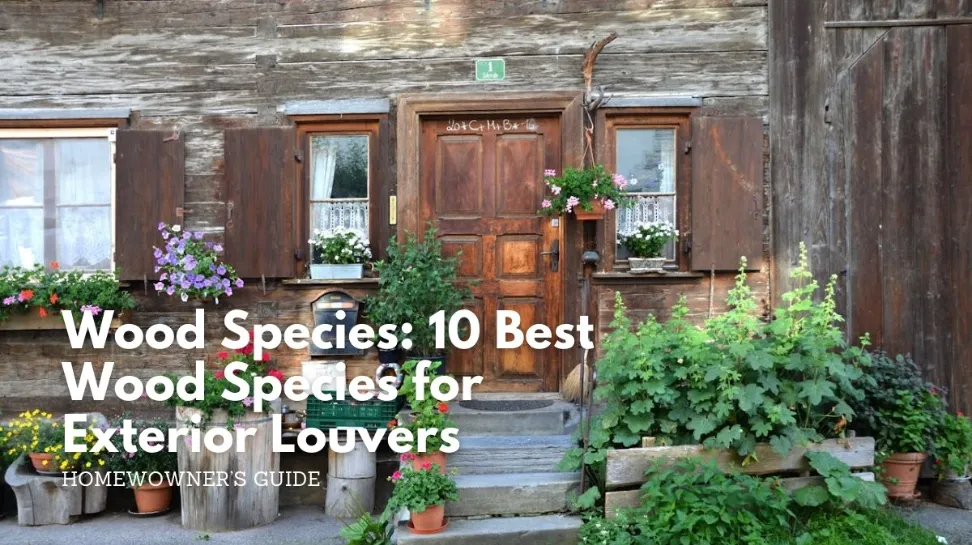Wood Species: 10 Best Wood Species For Exterior Louvers
When it comes to choosing the right wood species for exterior louvers, consider these wood species for shading, ventilation, or aesthetics. Louvers are constantly exposed to harsh elements like rain, sunlight, humidity, and even insects. Using the wrong type of wood can lead to warping, rotting, or fading within just a few years. The right wood, however, will provide decades of durability while enhancing your home’s natural charm.
Not all woods are created equal. Some species are naturally weather-resistant, while others need heavy treatment to withstand outdoor conditions. Factors such as density, resistance to pests, cost, and workability must be considered before making a choice.
In this guide, we’ll explore the 10 best wood species for exterior louvers. Each option is reviewed based on durability, maintenance, and visual appeal. Whether you’re renovating, building new, or just curious, this list will help you select the perfect wood species for louvers that are built to last.
Table of Contents
Why Choosing the Right Wood Matters
Exterior louvers are not only functional but also architectural features. Unlike indoor woodwork, louvers face continuous exposure to UV rays, rainfall, and temperature fluctuations. If the wood species isn’t suited for outdoor conditions, you’ll end up with cracked, faded, or pest-infested louvers within a short time.
The right wood species ensures:
- Durability: Resistance against rot and weather damage.
- Low Maintenance: Minimal treatment needed to preserve appearance
- Aesthetic Value: Rich natural color and grain patterns.
- Longevity: Louvers that remain strong and beautiful for decades.
10 Best Wood Species for Exterior Louvers
Teak
Teak is one of the most premium choices for outdoor applications. Its natural oils make it highly resistant to water, pests, and rot. Over time, it develops a silver-grey patina if left untreated. While expensive, teak louvers require minimal maintenance and last for decades.
Western Red Cedar
Lightweight yet durable, Western Red Cedar is a favorite for louvers. It resists decay and insects naturally, and its rich reddish-brown tones provide an elegant finish. It’s also easy to work with, making installation straightforward.
Ipe (Brazilian Walnut)
Ipe is known as one of the hardest woods in the world. Dense and extremely durable, it resists rot, mold, and termites. Its dark brown tones are stunning, though it requires pre-drilling for fasteners due to its density.
Accoya
Accoya is a modified wood that undergoes acetylation, making it highly stable and resistant to shrinking or swelling. It’s eco-friendly, non-toxic, and lasts for 50+ years outdoors. Perfect for louvers in humid or rainy regions.
Mahogany
A classic wood species, mahogany offers strength, workability, and weather resistance. With proper sealing, it can last for years outdoors. Its rich reddish hue makes it a stylish option for architectural louvers.
Cumaru (Brazilian Teak)
Often compared to Ipe, Cumaru is extremely dense and durable. It’s resistant to rot, fungus, and insects, making it ideal for louvers exposed to harsh climates. It has a striking golden-brown color that deepens with age.
Douglas Fir
Douglas Fir is widely available and more affordable than exotic hardwoods. It’s moderately resistant to decay but performs best when treated with sealants. Its straight grain makes it visually appealing for louvers.
Redwood
Naturally resistant to moisture and decay, redwood is an excellent choice for exterior louvers. It’s lightweight yet strong and has a warm red hue that weathers beautifully over time. Sustainability-conscious homeowners also appreciate redwood sourced from responsibly managed forests.
Oak (White Oak)
White oak is tougher and more water-resistant than red oak, making it a better option for exterior applications. It’s durable, widely available, and finishes well with stains or oils to enhance its grain.
Thermally Modified Wood
This wood is heat-treated to improve durability and stability. Thermally modified wood resists moisture, insects, and warping, making it increasingly popular for louvers. It’s eco-friendly and available in various species
How to Maintain Exterior Louvers
Even with the best wood species, maintenance is key to long-lasting louvers.
- Seal or Oil Annually: Protects against moisture and UV rays.
- Clean Regularly: Remove dirt and mildew with mild soap and water.
- Inspect for Damage: Look for cracks, rot, or insect activity and repair quickly.
- Allow Ventilation: Ensure louvers are properly installed to reduce moisture buildup.
Choosing the right wood species for exterior louvers ensures strength, style, and durability for years to come. From teak and cedar to modern options like Accoya and thermally modified wood, there’s a perfect fit for every climate and budget. Want to explore more wood tips? For more expert woodworking insights, subscribe to our newsletter and stay connected with Wooden Edge Studios.

